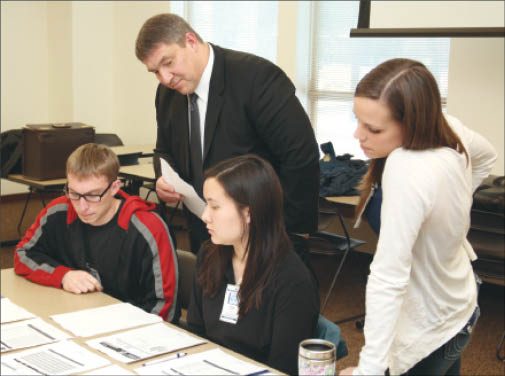
Home » Whitworth forensic accounting course involves workshop coached by IRS agents
Whitworth forensic accounting course involves workshop coached by IRS agents
Whitworth course includes hands-on fraud workshop coached by federal agents

March 1, 2012
Sure, these agents carry sidearms, but they take down criminals with spreadsheets.
As part of an investigative course held biennially at Whitworth University, special agents with the Criminal Investigation unit of the Internal Revenue Service lead a couple dozen college students in a hands-on law-enforcement exercise that shows them how to uncover the hidden tracks of financial crimes.
The one-day simulation, called the Adrian Project, is geared toward accounting majors rather than criminal justice students. It's run by agents with badges and handcuffs as part of an occupational fraud and abuse course taught by associate professor Heather Rogers.
"We want the course to be interactive," says Rogers, a Whitworth faculty member since 2005 and a forensic accountant and fraud investigator in private practice.
The Adrian Project encourages students to engage practical applications of investigative—or forensic—accounting concepts to identify cases of embezzlement, tax evasion, and financial fraud, she says.
"It helps when concepts learned in class are planted in context," Rogers says.
During the exercise, the students split into five teams, each accompanied by one or two active IRS special agents, and work on investigations inspired by real-world criminal cases.
Throughout the day, the students interview witnesses and suspects as played by university staff and faculty volunteers. The teams also scour financial documents, serve search warrants, and even practice surveillance on the campus north of Spokane, using IRS equipment to gather evidence of hidden income and illicit assets.
Marisa Shumake, a junior majoring in accounting, says the workshop shows her a whole new area for applying accounting skills.
"I hadn't even thought about criminal investigation," Shumake says after leading her team's interview of a witness in a mock money-laundering case. "I always felt accounting work was more limited."
The IRS Criminal Investigation unit brings in some agents from the Spokane office and others from around Puget Sound to help with the Adrian Project here, says Mike Ball, Spokane-based supervisory special agent with IRS Criminal Investigation.
The unit recently added two Spokane-based agents to bring its permanent force here to six.
Ball says that's a high number of agents for the population here, but the Spokane area has been home to an inordinate number of tax-evasion schemes and complex fraud cases, including major Ponzi scams and shady stock deals.
"We're trying to identify illegal gains the bad guys are getting and take it away from them," he says.
Mark Davis, a senior accounting major, heard about the Adrian Project when he was a sophomore and has been anxious to participate in it.
"It's only offered every two years to fill an accounting elective requirement," Davis says.
He says it's important to be able to understand through accounting how a business can go wrong.
"This needs to be paid attention to," Davis says. "Accounting is the life story of a business. It can tell you everything."
The Criminal Investigation unit is comprised of 4,100 employees worldwide. About 2,700 are special agents who investigate complex financial crimes associated with tax evasion, money laundering, narcotics, organized crime, public corruption, health-care fraud, investment fraud, and terrorism. It also investigates suspected violations of the Bank Secrecy Act of 1970, which requires banks and other financial institutions to report suspicious monetary activity to federal authorities and avoid being intermediaries in illicit transactions.
Ball says the Criminal Investigation unit often conducts investigations jointly with other law-enforcement agencies, including the FBI, U.S. Drug Enforcement Agency, and state and local police agencies. While other federal agencies also have investigative jurisdiction over money laundering and some Bank Secrecy Act violations, the IRS is the only agency that can investigate federal tax crimes, he says.
Rogers says the project goal is to induce students to explore career choices in forensic accounting.
"Usually, after a session, four or five students come to me and say, 'This is what I want to do,'" she says.
Ball adds that the IRS isn't the only agency that's looking for people with interests in forensic accounting.
"A lot of law enforcement needs people to investigate financial crimes," he says.
The project is named for Adrian College, in Michigan, which was the first college to host it.
Whitworth was the first college in the Pacific Northwest to participate in the Adrian Project, Rogers says.
It has also been held at the University of Las Vegas, Rutgers University, Arizona State University, and Florida State University.
Latest News
Related Articles





